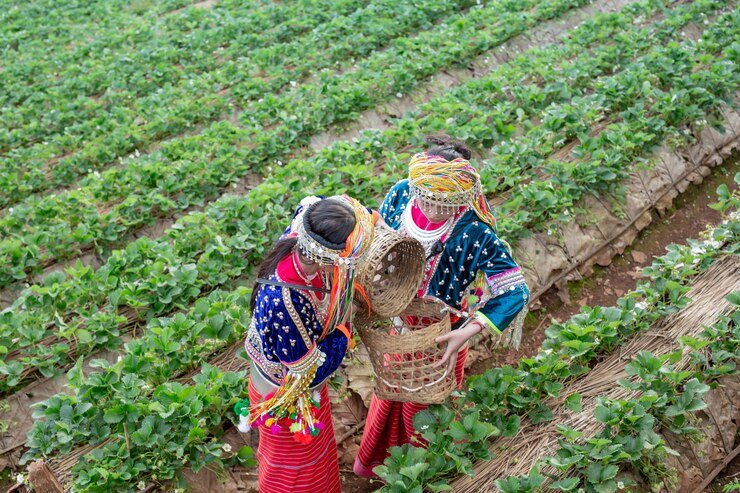Revolutionizing Indian Agriculture
Introduction :
What is the Importance of Revolutionizing Indian Agriculture?
India’s agriculture sector is not only vital for domestic food security but also plays a significant role in global food production. However, traditional farming methods have often led to environmental degradation, soil depletion, and water scarcity. Revolutionizing Indian agriculture is essential to ensure sustainable development, preserve natural resources, and meet the food demands of a growing population.
The Role of Technology in Sustainable Farming
How Technology is Shaping Agriculture in India
AI and Machine Learning in Crop Management
Artificial intelligence (AI) and machine learning have revolutionized crop management by providing farmers with valuable insights for decision-making. AI algorithms analyze data on weather patterns, soil conditions, and crop health to optimize planting schedules, predict yields, and manage pest outbreaks efficiently.
IoT Applications in Precision Farming
The Internet of Things (IoT) has enabled precision farming practices that minimize resource use and maximize productivity. IoT sensors monitor soil moisture levels, nutrient content, and weather conditions in real-time, allowing farmers to apply water, fertilizers, and pesticides precisely where and when needed. This targeted approach not only conserves resources but also enhances crop quality and yield.
Organic Farming Techniques in India
Overview of Organic Farming Methods
Organic farming emphasizes the use of natural inputs and techniques that maintain soil health and biodiversity. Techniques such as crop rotation, composting, and biological pest control reduce reliance on synthetic chemicals and promote sustainable agricultural practices.
Benefits of Organic Farming Practices
Environmental Impact
Organic farming practices help reduce soil erosion, improve soil structure, and enhance biodiversity by avoiding the use of synthetic pesticides and fertilizers. This approach promotes long-term soil health and minimizes negative environmental impacts.
Health Benefits
Organic produce is free from harmful chemical residues, making it safer for consumers. Growing consumer awareness and demand for organic products have created a lucrative market for farmers adopting organic farming practices.
Water Management Strategies
Challenges in Water Availability
Water scarcity is a significant challenge in Indian agriculture, exacerbated by climate change and inefficient water management practices. Sustainable water management strategies are crucial to ensure water availability for agriculture while preserving water resources for future generations.
Techniques for Efficient Water Usage
Rainwater Harvesting
Gathering and storing rainwater for use in agriculture is known as rainwater harvesting. Simple rooftop collection systems to expansive reservoirs and ponds are among the methods used to replenish groundwater and supply additional irrigation during dry spells.
Drip Irrigation Systems
Drip irrigation delivers water directly to the roots of plants, minimizing evaporation and runoff compared to traditional flood irrigation methods. This precise water application method not only conserves water but also improves nutrient uptake by crops, resulting in higher yields and better crop quality.
Crop Diversification and Its Benefits
Importance of Crop Diversification
Monoculture farming practices, where a single crop is grown repeatedly on the same land, can lead to soil degradation, pest outbreaks, and economic risks due to market fluctuations. Crop diversification involves growing a variety of crops in rotation or simultaneously, which helps maintain soil fertility, reduce pest pressure, and spread risks associated with market volatility.
Examples of Diversified Crops in India
Integrated Farming Systems
Integrated farming systems combine crop cultivation with livestock rearing, poultry farming, or aquaculture. This holistic approach optimizes resource utilization, enhances farm productivity, and provides multiple income streams for farmers. By diversifying their agricultural activities, farmers can mitigate risks and achieve sustainable livelihoods.
Government Initiatives Supporting Sustainable Agriculture
Policies Promoting Sustainable Practices
The Indian government has introduced several initiatives to promote sustainable agriculture and support farmers in adopting eco-friendly practices. These initiatives include financial incentives, subsidies, technical assistance, and market support to encourage the transition towards sustainable farming methods.
Subsidies and Incentives for Farmers
Government subsidies are available for organic certification, purchase of eco-friendly farming equipment, and implementation of water-saving technologies like drip irrigation systems. These incentives aim to reduce the financial burden on farmers and promote the widespread adoption of sustainable agricultural practices.
Success Stories
Several success stories highlight the positive impact of government support on farmers adopting sustainable practices. From increased crop yields to improved soil health and enhanced biodiversity, these success stories demonstrate the economic and environmental benefits of sustainable agriculture.
Economic Impact of Sustainable Farming Practices
Cost-Effectiveness of Sustainable Methods
Contrary to conventional belief, sustainable farming practices can be cost-effective in the long run. While initial investment costs may be higher, benefits such as reduced input costs, improved soil fertility, and access to premium markets for organic produce contribute to higher profitability and sustainable livelihoods for farmers.
Market Demand for Organic Products
Growing consumer awareness of health and environmental issues has fueled demand for organic food products in India and globally. Farmers practicing organic farming can command premium prices for their produce, tapping into lucrative niche markets and export opportunities.
Export Potential
Certified organic products from India meet stringent international standards, opening up export markets and generating foreign exchange earnings. By capitalizing on the growing global demand for organic and sustainably produced food products, Indian farmers can diversify their income sources and improve their livelihoods.
Challenges and Solutions in Implementing Sustainable Farming
Barriers to Adoption
Despite the benefits, several challenges hinder the widespread adoption of sustainable farming practices in India. These challenges include lack of awareness, technical knowledge gaps, limited access to credit and inputs, and inadequate infrastructure for market access.
Solutions and Recommendations
Addressing these barriers requires concerted efforts from policymakers, agricultural extension services, research institutions, and non-governmental organizations (NGOs). Capacity-building programs, farmer training workshops, knowledge-sharing platforms, and improved access to finance and markets are essential to overcoming these challenges and promoting sustainable agriculture across India.
Case Studies of Successful Farms in India
Examples of Farms Implementing Sustainable Practices
Numerous farms across India have successfully implemented sustainable farming practices, demonstrating the feasibility and benefits of eco-friendly agriculture. These case studies highlight innovative approaches, technological interventions, and successful business models that have transformed agricultural landscapes and improved livelihoods.
Lessons Learned from Pioneers
By sharing experiences, best practices, and lessons learned from successful farmers and agricultural entrepreneurs, other farmers can gain valuable insights and inspiration to adopt sustainable farming practices. Peer learning, mentorship programs, and farmer-to-farmer knowledge exchange play crucial roles in scaling up sustainable agriculture initiatives nationwide.
Future Trends in Indian Agriculture
Predictions for the Future of Sustainable Farming
The future of Indian agriculture is poised for further transformation through technological advancements, policy reforms, and evolving consumer preferences. As climate change poses new challenges, innovations in agri-tech, biotechnology, and sustainable farming practices will play pivotal roles in ensuring food security, environmental sustainability, and economic resilience.
Innovations on the Horizon
Emerging technologies such as blockchain for supply chain transparency, precision agriculture tools powered by AI and IoT, and biotechnological advancements for climate-resilient crops hold promise for revolutionizing Indian agriculture. These innovations will enable farmers to make informed decisions, optimize resource use, and mitigate risks associated with climate variability and market fluctuations.
Conclusion :
Summarizing the Impact of Sustainable Practices on Indian Agriculture
In conclusion, revolutionizing Indian agriculture through sustainable farming practices is imperative for achieving food security, preserving natural resources, and fostering rural development. By embracing innovation, leveraging technology, and implementing supportive policies, India can lead the way towards a sustainable agricultural future that benefits farmers, consumers, and the environment alike.
FAQs (Frequently Asked Questions)
What are sustainable farming practices?
Sustainable farming practices aim to maximize productivity while minimizing environmental impact, focusing on long-term sustainability.
How does organic farming benefit Indian farmers?
Organic farming reduces input costs, preserves soil fertility, and accesses premium markets, enhancing farmers’ incomes.
Why is water management crucial in Indian agriculture?
Efficient water management ensures optimal crop growth amidst water scarcity, improving agricultural productivity and resilience.
What government support is available for sustainable farming in India?
The Indian government provides subsidies, training, and market incentives to encourage farmers to adopt sustainable practices.
What role does technology play in modernizing Indian agriculture?
Technologies like AI, IoT, and precision farming tools optimize resource use, enhance productivity, and mitigate environmental impact.

